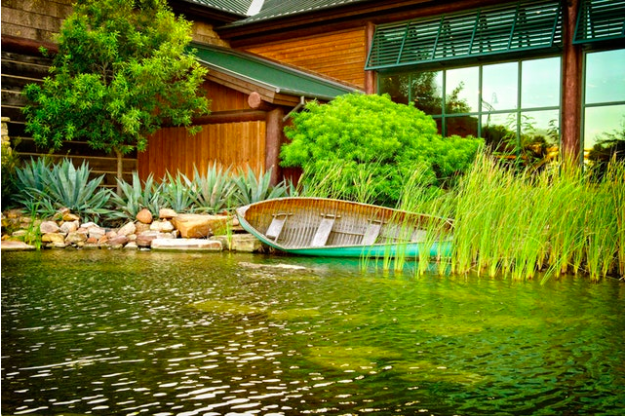
Natural swimming pools became popular in Europe several decades ago, and they are quickly emerging in the United States. Unlike traditional swimming pools that are filled with chlorine-treated water, natural pond-like pools rely on aquatic plants to filter and clean the water. These pools are also adaptable and work well in a range of climates.
Even though there are plenty of advantages to natural pools, there are some considerations to keep in mind. Let’s explore what these are below.
Natural pools are beautiful but more expensive.
Though some people claim that natural pools aren’t any more expensive than conventional ones, you can expect a larger investment. Natural pools require a small, separate pond to be built right by the main pool for filtration. Water from the main pool enters the pond through a gravel filter or waterfall and is then cleaned organically. Expect this extra construction to drive up costs.
Additionally, there are far less pool builders that specialize in natural pools, so prices aren’t as competitive. As with any pool building project, always obtain several quotes and ask for the builder to show you pictures of the work they have done in the past.
Natural pools can save money in the long run, but this won’t do you any favors if you sell soon.
Over time, natural swimming pools cost less to maintain because the pool builds a small ecosystem that runs largely on its own. However, this takes many years to develop. If you plan on selling your home in the near future, it’s probably best to stick with a traditional pool that will give you a bigger return.
You don’t have to worry about pool chemicals, but organic water can be off-putting to some.
Even though chemicals are used in traditional pools, many people don’t feel clean unless they’re swimming in crystal clear water. This won’t happen in a natural pool, as the water often has a brownish tint from the algae. No matter how clean you keep the pool, you can’t get rid of this sediment completely. The good news is that the water is perfectly safe to swim in, if you can get past the fact that it’s brown.
Natural pools can be difficult to maintain, especially if you’re used to chlorine pools.
If you grew up with a chlorine pool, or moved from a home that had one, caring for a natural pool definitely comes with a learning curve. We can compare caring for a natural pool to caring for a garden. You will have to prune plants and ensure that you have the right balance of aquatic life, daphnia and floating plants. Also, basic pool care applies, such as using a skimmer net, dismantling and draining filtration systems and keeping the pool covered in the winter.
There are clear benefits to natural pond-like pools, and you may decide that these benefits outweigh the drawbacks. There is no right or wrong pool, as everyone’s needs are different. What we recommend is doing your research, asking questions and obtaining several quotes to determine the best investment for your family. For information on building a swimming pool that meets your family’s needs, contact Paradise Pools today.

 CALL US TODAY!
CALL US TODAY!



